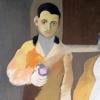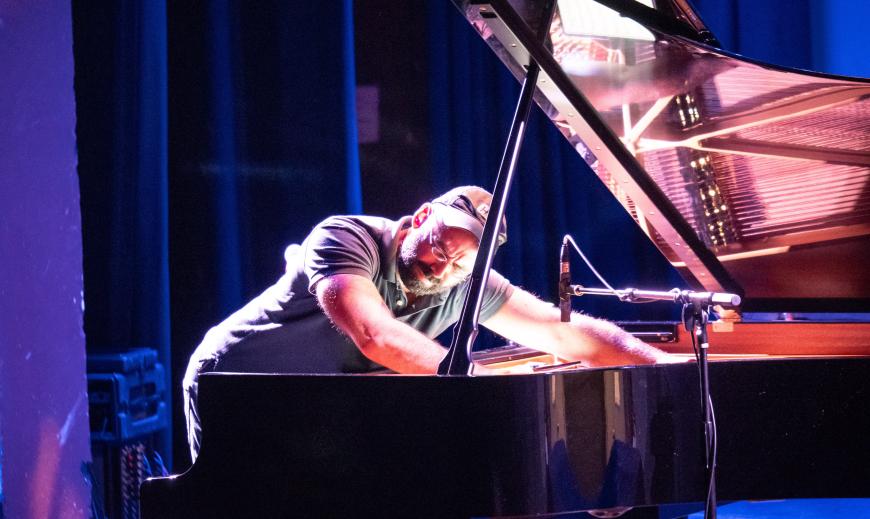
When Adam Tendler jogs to the keyboard, he’s not just taking the stage — he’s taking over. At San Francisco’s Brava Theater on July 17, if the energetic New York-based pianist seemed in a rush of excitement to perform, it might have been because his tour program, “Inheritances,” featured the Bay Area premieres of 16 short compositions. In the style of a one-man show, Tendler’s exuberant manner captured attention.
The performance, produced by Other Minds, was much more than a series of new works for piano. The subject was Tendler’s flawed relationship with his father — a man “hiding” in plain sight who bequeathed the cash that Tendler used to commission these compositions. The program brilliantly navigates layers of inheritance as Tendler balances irony and vulnerability, with each of the 16 composers exploring an aspect of heritage, parenthood, or grief.
The pianist exercises interpretive choices with his voice, hands, and feet. He responds to both musical notation and recorded verbal prompts, such as in Darian Donovan Thomas’s We don’t need to tend this garden. They’re wildflowers — a title that is an apt metaphor for both parenting and the free-composition techniques that yielded spontaneity on Wednesday.
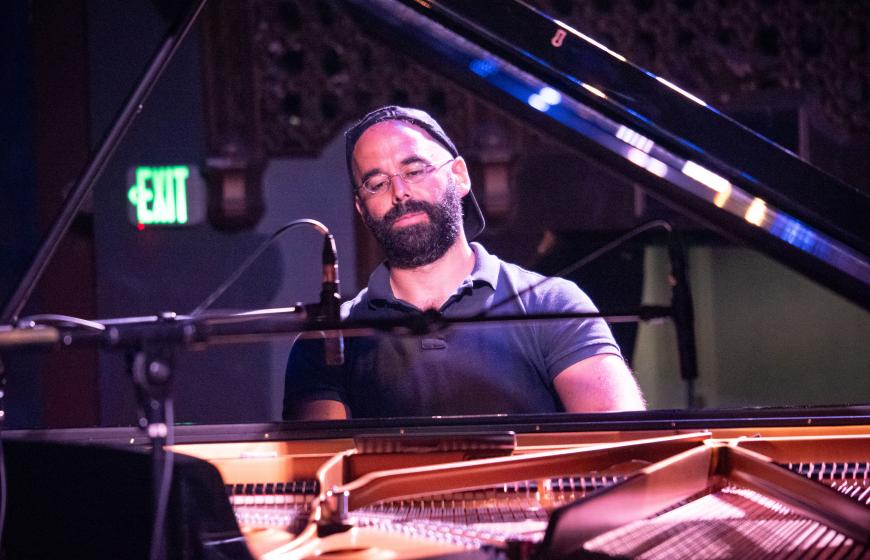
“Inheritances” features comfortably contemporary, rarely startling music subsumed in catchy words and disturbing statements. Words are so important that the expressive titles of the compositions, such as Missy Mazzoli’s Forgiveness Machine, are projected on a screen throughout the performance. The sequence of pieces is enhanced by mood and tempo relationships, easing the transitions from one composition to the next. And there are stylistic consistencies, such as the recurrence of impressionistic harmonies and the use of the keyboard’s highest register. The program’s words-by-words episodic structure is reminiscent of Olivier Messiaen’s Vingt Regards sur l'enfant-Jésus.
Laurie Anderson’s Remember, I Created You opened the program with poetry meditating on how people make their marks on the world. The concert as a whole continually played on the fact that all of this music was created on commission, yet ironically, Anderson’s piece exhorts Tendler to dilute the newness of these scores by summoning musical reminiscences (such as an excerpt from J.S. Bach) to challenge and please his father. Correspondingly, Anderson’s title returns within Thomas’s work.
The dramatic turning point of the evening was a home video from Tendler’s childhood, projected during inti figgis-vizueta’s piece hushing and subduing the turbulent and dramatic music into a background role. We heard the voice of Tendler’s father admonishing partying children in the video to “do something” while the pianist was playing with the freedom inherent in the score.
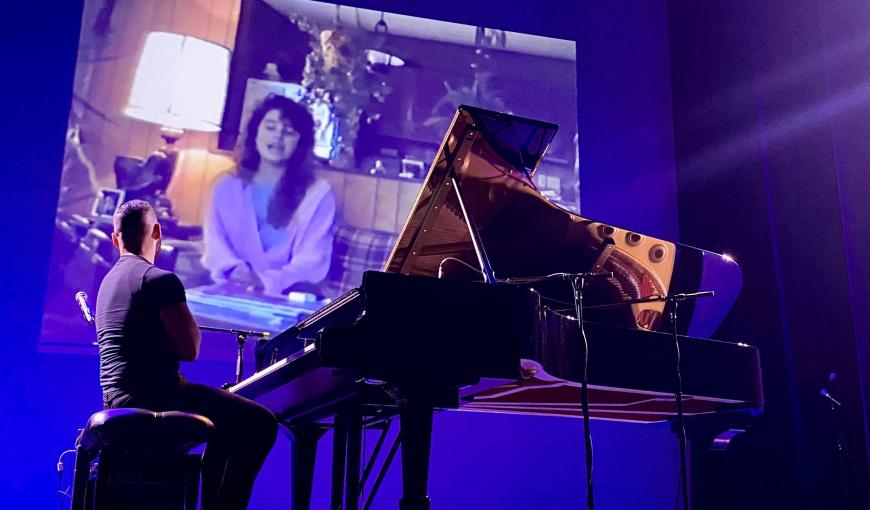
In this context, some otherwise strictly musical ideas on the program nonetheless seemed narrative. For example, Scott Wollschleger’s Outsider Song tends to juxtapose prepared piano effects against key-struck notes. The effect reflects Tendler’s personal predicaments as an iconoclastic musician and a son often estranged from his father. The tones from inside the piano could have been taken as part of the melodic line or as interjections, creating ambiguity.
Pamela Z’s Thank You So Much was the most playful moment of the program and was inspired by Tendler’s manner of speaking. The music punched out the four syllables of the title, while Tendler recited the words. Of course, the joke is on us. We don’t know who’s thanking whom: son or father, the pianist or the applauding audience, the composer or the performer.
Amid the wordplay, there were plenty of purely musical highlights, such as the spiraling upward tensions in Mary Prescott’s What It Becomes. In Marcos Balter’s False Memories, unexpected flights of fancy and disorienting hesitancies showcased Tendler’s prodigious ability to shade color and control timing.
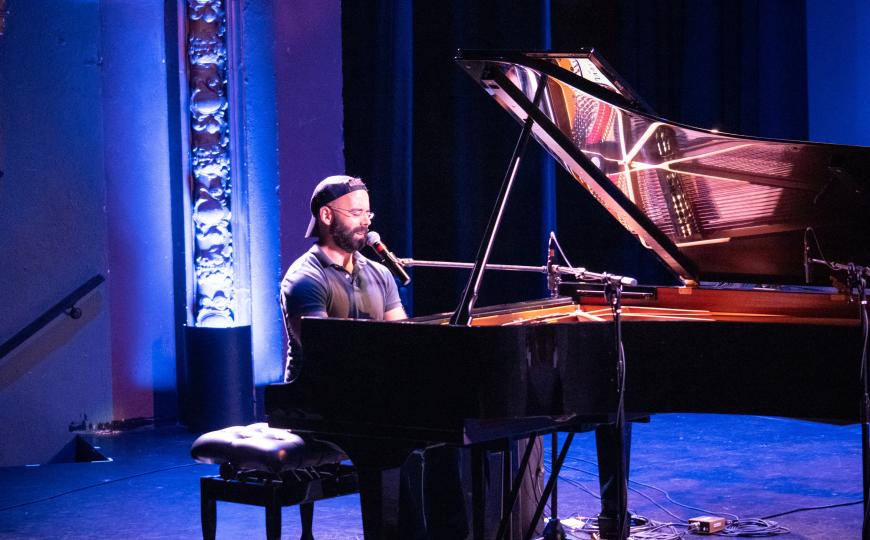
The encore-like pieces following Z’s composition unwound the dramatic tension with delights based on the inheritance of past musical styles. Nico Muhly’s Eiris, Sones clarified grief into a soulful chorale. The program concluded with a rapturous performance of Devonté Hynes’s Morning Piece, which made a bel canto statement, replete with trills, about the performer’s ability to project his personality through shaping a melody.
The other acclaimed composers on the program included Timo Andres, Christopher Cerrone, John Glover, Ted Hearne, Angélica Negrón, and Sarah Kirkland Snider. All of the pieces have potential to find places on other, more traditional programs — another kind of inheritance. Furthermore, Tendler’s personal and engaging concert is challenging and energizing but eschews a didactic approach. It’s a format worth emulating.



